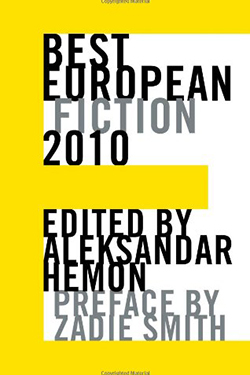Best European Fiction 2010
edited by Aleksandar Hemon
reviewed by Lisa Nold
In his introduction to Best European Fiction 2010, Aleksandar Hemon asserts that only three to five percent of literary works published in the United States are translations. He leaves this statistic unattributed but a quick survey of the tabletops in any major U.S. bookshop will back this claim. Aside from big-name writers such as Stieg Larsson, José Saramago, and Günter Grass, translated works of European literature are largely absent. This absence is even more apparent when it comes to short fiction, but on this point Aleksandar Hemon and Dalkey Archive Press have a solution.
In the first of what promises to be an annual series, Hemon presents a landscape of contemporary European literature that is as multi-faceted and diverse as the countries of Europe itself. This collection of thirty-five stories offers everything from Kafkaesque tales and works of magical realism to grit, verbal experimentation, sentimentality, and folktale. It’s a crowded house to be sure, but there are many standouts.
Among them is “Fourteen Little Gustavs,” an affecting story by the Macedonian writer Goce Smilevski, who explores the little-known fact that Gustav Klimt fathered at least fourteen children during his lifetime. Though they were probably not all named Gustav in real life, they are in the story, and the fictional conceit is a pleasure to follow. Of the elder Gustav Klimt, Smilevski writes:
Almost certainly the bed was a battleground for him, a place where pleasure and anger became indistinguishable—and, as the creation of his paintings advanced, large bruises sometimes appeared on the bodies of his female models. Even his paint wasn’t safe from attack—he would jab his brush into his palette and then swipe it over his canvas like the victor in a duel magnanimously granting a foe his life. If there was one word to sum up his existence, it would be “fight.”
There is also the wonderfully bizarre “Friedmann Space” by the well-known Russian author Victor Pelevin. In a sober narrative voice, this story describes a literal human tilt toward money and the consciousness of the mega-rich. The story begins:
Experts agree that a sizable portion of contemporary popular culture functions according to a principle they’ve dubbed the “windmill”: the merely comfortable selling the poor fantasies about the lives of the rich, the very rich, and the fabulously rich. Often this pattern varies by way of some colorful true-life detail coming out: one of these merely comfortable individuals showing the tabloids around his actually rather modest house in the opulent Rublev neighborhood of Moscow, for instance, all the while parroting some legitimate example of a famous oligarch’s conversation that he’s managed to overhear (like the sacramental phrase such powerful men always repeat on arriving in London, fresh from visiting their goldmines in the far north: “Why, the Siberian winter was really quite mild, this year!”).
The confident run-on sentences recall Gogol, as does the complex and ironic mayhem that unfolds. Similar authorial poise can be found in the Polish author Michał Witkowski’s “Didi,” a gritty tale about a runaway from Bratislava who turns to male prostitution in Vienna as a means to survive. The story, which is translated from Polish by the non-gender-specific “W. Martin,” commendably preserves several lines like “I’m a lazy woman” and “I’m tired today, leave me alone” in Slovakish and German with translations at the bottom of the page. This not only highlights important cultural distinctions, but also forces the reader to better understand the cross-cultural trap that Didi has fallen into.
There are other notable stories like “Revelation on the Boulevard of Crime” by Castilian writer Julián Ríos; “Ice Moon” by Swiss writer Peter Stamm; “The Sky over Thingvellir” by Icelandic writer Steinar Bragi; and “Noir in Five Parts and an Epilogue” by Catalan writer Josep M. Fonalleras. At 360 pages, the anthology also has its weaker moments and includes stories and novel excerpts that wander or suffer the burden of their own cleverness.
Nevertheless, the sum is positive and it must be admired. The stories in this anthology do not ache for recognition in the way that stories sometimes do in American anthologies. Rather they do the quiet and hard work of building worlds for the reader to explore. Many of the writers in this anthology are still underrecognized, but with Aleksandar Hemon and Dalkey Archive Press as their boosters, they may find higher ground and hopefully bring the short story along in the process.
Published on June 20, 2013

